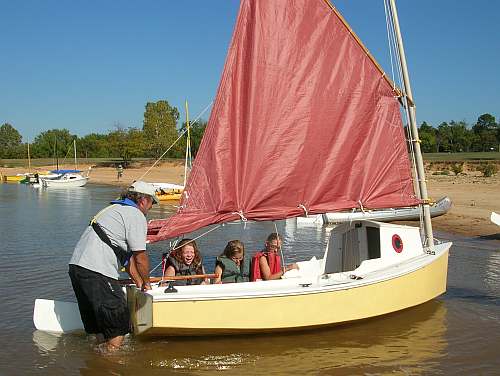
Grand Dad takes a new crew out in his Skat at Sail OK.
Contents:
Contact info:
Jim Michalak
118 E Randall,
Lebanon, IL 62254Send $1 for info on 20 boats.
Jim Michalak's Boat Designs
118 E Randall, Lebanon, IL 62254
A page of boat designs and essays.
(1November) This issue presents Sail Oklahoma 2011, first installment. More next issue.
THE BOOK IS OUT!
BOATBUILDING FOR BEGINNERS (AND BEYOND)
is out now, written by me and edited by Garth Battista of Breakaway Books. You might find it at your bookstore. If not check it out at the....ON LINE CATALOG OF MY PLANS...
...which can now be found at Duckworks Magazine. You order with a shopping cart set up and pay with credit cards or by Paypal. Then Duckworks sends me an email about the order and then I send the plans right from me to you.

|
Left:
Grand Dad takes a new crew out in his Skat at Sail OK. |
|
|
Sail OK 2011 a
OFF TO SAIL OKLAHOMA 2011!!!
I was under orders to be there at the Monies estate on beautiful Lake Eufala by Friday night. But I was lucky enough to hitch a ride with Paul Ellifrit who is a regular at our Rend Lake meets. It's a three hour drive from here to near Columbia, Mo, where Paul lives in rural splendor. How many of you have an old tree growing right around an even older Model T chassis?
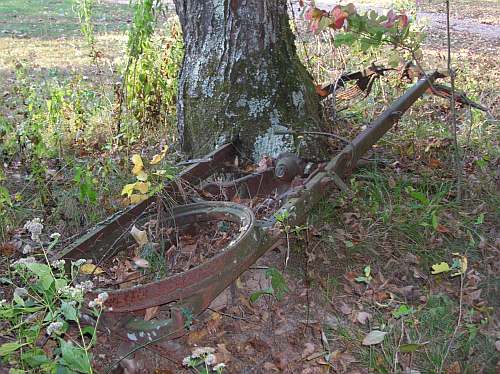
We hit the road early Thursday with the idea of getting to Eufala by late afternoon after 7 or 8 hours on the road. Paul was towing his Family Skiff. A nice day to drive through southwestern Missouri and into Oklahoma. With Jackie Monies' maps we arrived unlost in plenty of daylight, set up our tents, and then down quickly to the lake. We were hardly the first.....

The lake was low, as you see. That made for a glorious beach, nice firm clean sand. The sand and slope continue out to infinity as far as I could tell. The water was warm enough for swimming and you could wade way out with no sharp drop. Coming to land with a boat was quite predictable as to when you were going to contact the bottom. There was some concern about hitting submerge stumps and such. Some were plainly visible but I argue they were all there last year too, just as hazardous, but just below the surface and unseen then, causing no worries. Anyway, I didn't hit any.
Well, with low water the usual ramp, free and very near, didn't make it to the water. The smaller boats, even Paul's Family Skiff were still launchable there by backing down to the end, trailer extending out on the sand, and then with many happy hands available, lifted off the trailers and into the water. The larger boats had to use the Corps of Engineers ramp about a mile away.
So we strolled down the beach with the constant question "What's that?"
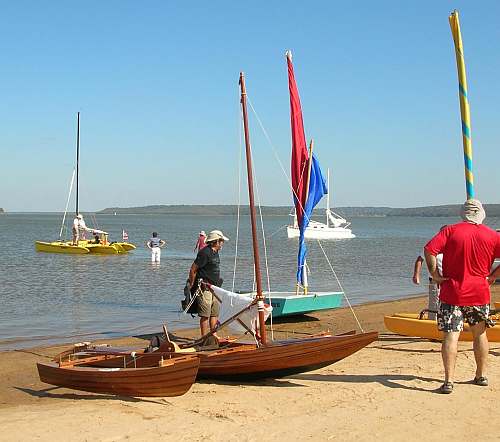
We expected a lot of Puddle Duck Racers this year in particular since the World Championships were to be part of the SailOK scene on Saturday but in this photo we see three trimarans plus Travis' Princess22 ketch in the background.
Here is a really tough What's That. (Answer later)
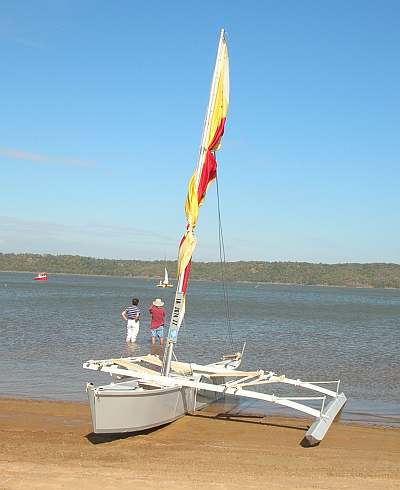
We wandered back to the Monies estate, just a few blocks walk from the beach, where several boatbuilding support groups were in conference. About this time the porta potti guy delivered what we needed and Jackie Monies told me a great story about him. Seems he saw all us old guys with beards and thought we were an Amish family reunion of some sort. For Paul and me this was the first of the many meals we were treated to over the weekend all catered by the Monies family who reunites to feed us all, meals in Mike's Boat Palace meant he has to put his many boat projects aside for a while.
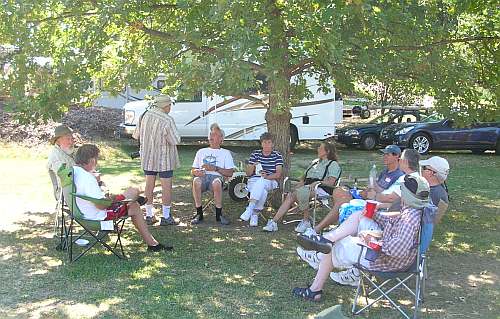
After supper and many yarns we turned into our tents for the night. Very sweet weather all the time we were there as you can see. I've done the Rend Lake meet for over 20 years and can attest that success and failure of a meet seems about 80 percent dependent on the weather. More boaters arrived during the night.
FRIDAY...
This was an interesting day for me. After the morning feed Mike Monies introduced me to his Catbox project. It was complete right down to its Indy500 paint scheme, each checkered flag block lovingly masked. Such a job! But he had never rigged it. He had all the parts and sort of told me it was my job from there on. What to do? Catbox has a lateen rig copied from the Sunfish design, in fact the idea was that you might steal a Sunfish rig from somewhere and go sailing with it on your Catbox. Well, I'd never rigged a lateen from scratch and I suppose my blueprints don't help a fellow much there. But with hardware, drill, and lots of line Paul and I muddled through and in an hour or two had it looking like it ought to be OK. We loaded it all into the back of Mike's pickup truck and thence down to the beach. More boats had arrived by now. But the scene looked like this in the morning.
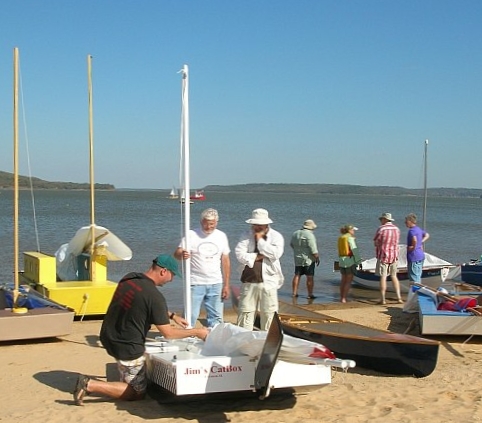
That is Woodenboat writer Tom Pamperin trying to figure what's what on the Catbox and the greybeard watching intently is Mike Monies. The wind was starting to blow briskly offshore, like last year. Tom said he would test fly Catbox.
But right here might be a good time to walk the beach for a closer look at the assembly of boats. And here is a great time to remind everyone that I never remember last names. I have to look at my driver's license to remember my own.
A couple of doors down we found this Welsford Scamp...
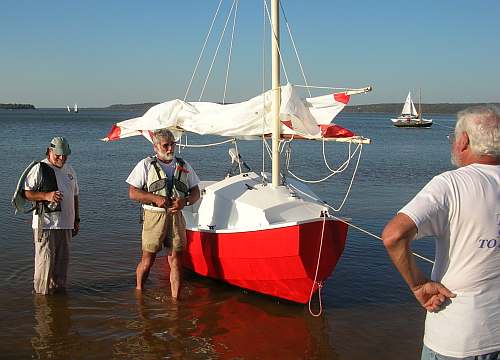
That is John Welsford hisself doing the last rigging (Mike Monies is big on making the designers do their own rigging). This Scamp has some history behind it already as Mike used it on both the Everglades Challenge and the Texas 200. I expected it to be beat up, that is to say to have a nice patina. But he has refinished and rerigged it. It got a good workout during the weekend with many demos. That's Mike Monies hisself on the right.
Around us more and more Puddle Ducks were unpacked, of all sorts.
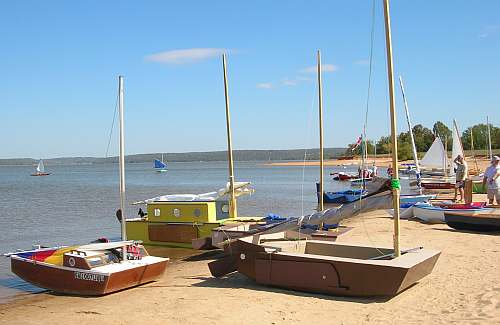
I think I did a double take on the yellow box boat you see. It looked like something I would design but it wasn't quite. It is a Goose which is a lengthened Puddle Duck with the house added. Built by Gene Berry in western Mo. I didn't see it sail but I know Gene lived on it during the trip and I think he was there about a week. Here's another photo....
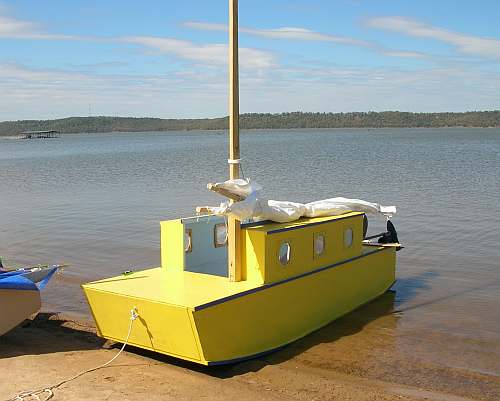
Another view down the line shows more Ducks and another Welsford boat. The Catbox is in the background with the lateen sail finally rigged and looking ready.
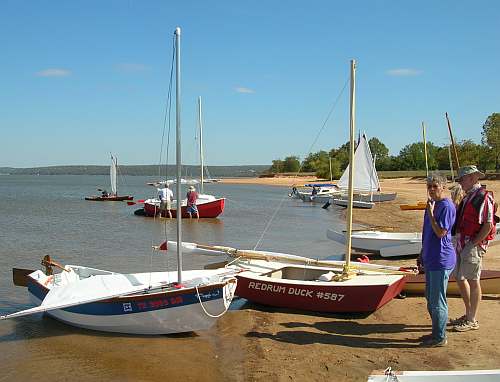
There is a Piccup Pram hiding there too, by Oklahoma Gene. This one got a good workout later in the weekend. This was Gene's first project and his "learned how to sail" boat.

I thought there was a surprising number of kayaks and canoes, sailing and otherwise. Here is a skin on frame boat and I think it was from scratch, not a commercial product..
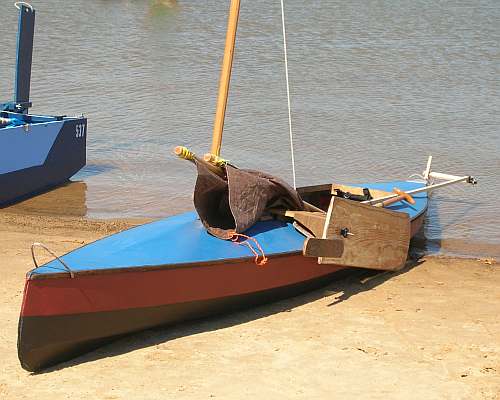
Next, I did a lot of head scratching when I saw the yellow Trinket. Surely a very fancy commercial boat, right? A close examination of it showed it was a plywood Marples design. Jeez it looked perfect! It all folded up neatly and fairly quickly to ride home on its trailer. The rig, I'm told, was stolen from a Hobie14 so no long list of fancy rigging required. Such a beautiful job!
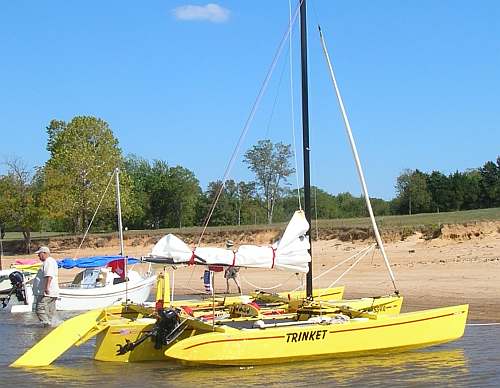
A few steps down the beach Paul Ellifrit had his Family Skiff ready to sail...
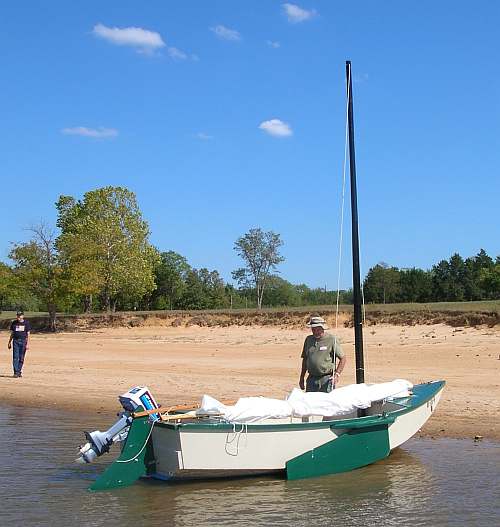
This next boat really intrigued me as it looked a lot like my Skat design with a small storage house added. That's exactly what it was! From Virginia as I recall and I gotta tell you it is really satisfying to see a boat I once drew, and never forget it is closely based on an Edson Schock design, in such great use. Grand Dad spent the days taking the grand kids out. Somehow he shoehorned them and himself into this 12' hull. It really went quite well and he should be proud of himself....

Here is a really nice decked canoe, I think a Millcreek...
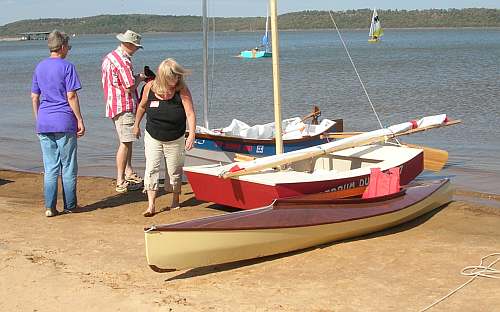
Here is an aluminum canoe modified to sail. It had a large lug sail. Normally I don't encourage this sort of boat but this one went quite well, I'll admit. It's not a proa in that it tacks instead of shunts...
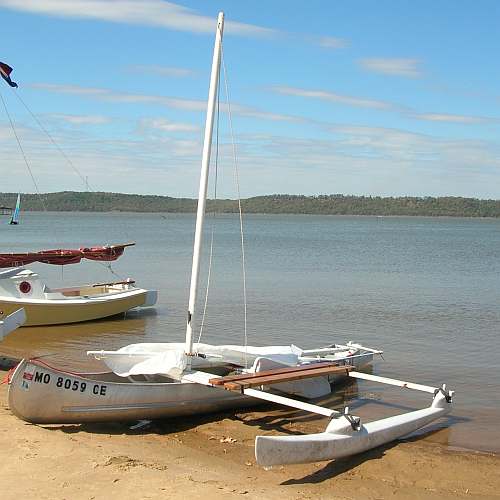
You can see this canoe sailing nicely in the background of this photo. In the foreground is a Herreshoff 12 1/2 which has a full keel.
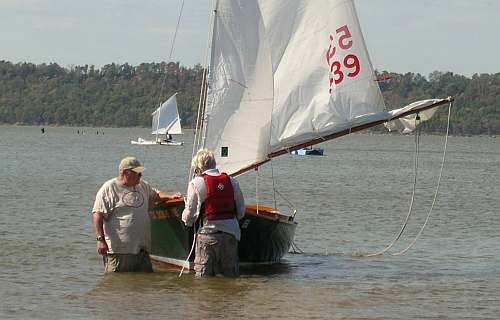
This tug was a work of art, electric art, too. All electric and he used a generator to recharge during lulls.

I came across a few more of my designs there. This is Stan Roberts' Family Skiff, veteran of the Texas200...

And here is that strip built Toto, with stripper tri conversion by John Farrell. This one got a lot of time in the water during the meet...
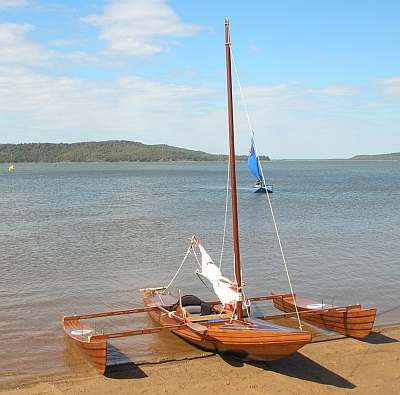
And as the sun got low it was time for one last view of the fleet....
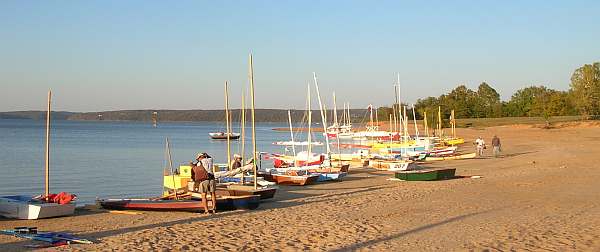
(I've put off the PDR photos until next issue, RACE DAY!)
BUT WAIT! WE'RE NOT DONE....
Back to the estate for dinner and more stories. After dark, Jackie Monies got out the microphone and amp and had an "Ask The Designer" session. So that was why I was told to be there by Friday evening as I was to be in one of three hot seats before the gathering. John Welsford was next and Graham Brynes next. Graham Brynes grew up in Brisbane, Australia, sailed around the world and somehow ended up in North Carolina where, unlike myself, he really makes a living doing real boats. He still has a great fire to do small boats though and is well known for his Core Sound boats and he won the Everglades Challenge in 2006 with his Core Sound 17 along with Fred VanRensburg. I felt a bit out gunned up there with two world travellers who make a good living doing real boats. But then I thought my own background, which is no boating background at all until I was maybe 30, and in the Midwest where we have to reinvent everything, was probably more like that of most MIdwest messabouters. So we just aswered questions as best we could based on our varied experiences. The questions were somewhat typical I think. About materials and how long to build. The sort of stuff that is pretty hard to explain and answer mostly because the builders vary so much and have different expectations. Luckily no one asked me why I draw ugly boats.
Then more yakking off to the tent again.
Next issue will present more boats that arrived for Saturday and review the Puddle Duck World Races!
Piccup Pram
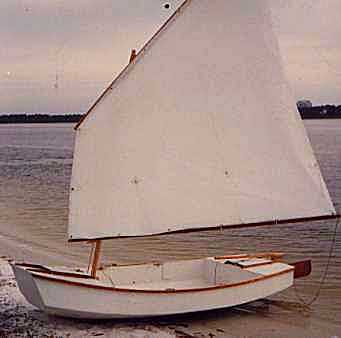
PICCUP PRAM, SAIL/ROW PRAM, 11' X 4.5', 90 POUNDS EMPTY
Piccup Pram was the first boat of my design to get built, back in 1990, I think. I still have the prototype and use it regularly. I designed it to be the best sail/row boat I could put in the back of my short bed pick up truck. But I found it to be a good cartopper, too. It has capacity and abilities I had previously thought impossible in a 90 pound cartopper. The photo above shows the original 55 square foot sail on Pensacola bay a long time ago. Piccup is a taped seam multichine hull which can take a fair amount of rough water.
Piccup continues to be one of my most popular designs and I get nice photos from builders. Here is one of Richard Donovan hoping for more wind up in Massachusetts.

Richard's Piccup has the larger 70 square foot sail that prefer myself. It's the same as the original but is 2' taller. This balanced lug sail sets on a 12' mast and rolls up easily for storage on its 9' yard and boom. The idea was to be able to store the rig easily in the boat during rowing and it works. There is a pivoting leeboard and kickup rudder on the boat and they can be left in place raised while rowing. Converting to full sail takes a couple of minutes as you step the short mast, clip on the halyard and tack lines, hoist the sail, lower the boards, and off you go. And the balanced lug sail reefs very well although reefing any small boat is best done on shore.
Here is a Piccup by Vince Mansolillo in Rhode Island, a nice father/son project. Piccup will be large enough to hold both of them. You can see the large open frameless cockpit, large enough for sleeping. And you see the buoyancy/storage boxes on the end.
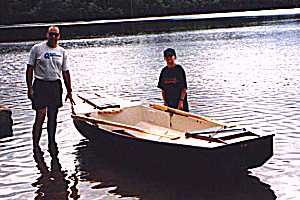
But Piccup will take two adults as seen in the photo of Jim Hudson's boat. Jim's boat has a polytarp sail as does my own Piccup.
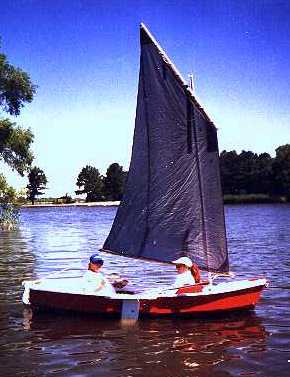
These boats have proven to be good for sail rig tinkerers (be sure to read and apply the Sail Area Math essay before starting). Here I am in Piccup with a polytarp sharpie sprit sail. The rig is different from the originals but the hull here is totally unchanged (except for paint) from the original shown on the beach at Pensacola.
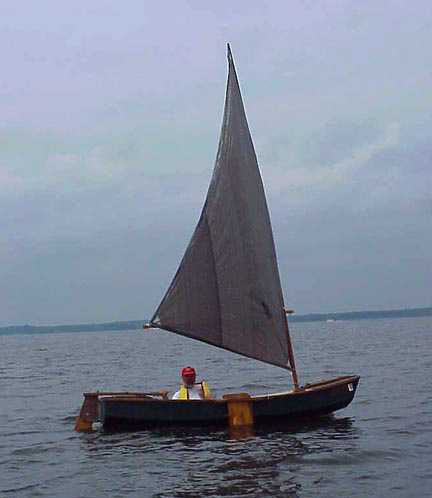
I think my own Piccup has had about six rigs of different sorts and was always the test bed for the polytarp sail experiments. But, hey!, that's nothing compared to the tinkering Reed Smith did with his out in California. Here is his Piccup rigged as a sharpie sprit yawl!
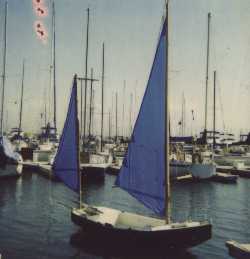
Here is Rob Rhode-Szudy's yawl rig Piccup that was featured in his essays about building Piccup that you can access through the old issue links.

Here is another by Doug Bell:

This one is by Jim Islip:
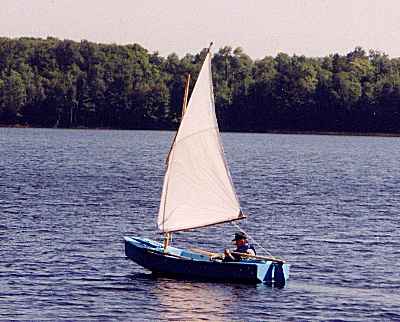
And this one by Ty Homer:
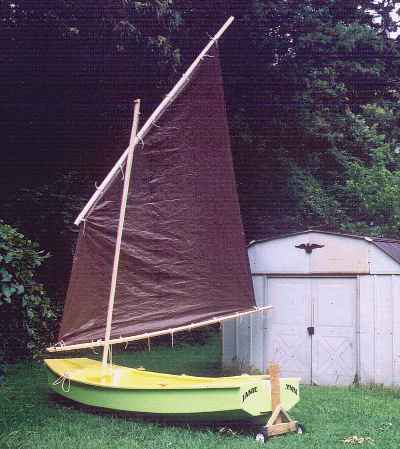
Piccup Pram uses taped seam construction from five sheets of 1/4" plywood.
Plans for Piccup are still $20.
Prototype News
Some of you may know that in addition to the one buck catalog which now contains 20 "done" boats, I offer another catalog of 20 unbuilt prototypes. The buck catalog has on its last page a list and brief description of the boats currently in the Catalog of Prototypes. That catalog also contains some articles that I wrote for Messing About In Boats and Boatbuilder magazines. The Catalog of Prototypes costs $3. The both together amount to 50 pages for $4, an offer you may have seen in Woodenboat ads. Payment must be in US funds. The banks here won't accept anything else. (I've got a little stash of foreign currency that I can admire but not spend.) I'm way too small for credit cards.
I think David Hahn's Out West Picara is the winner of the Picara race. Shown here on its first sail except there was no wind. Hopefully more later. (Not sure if a polytarp sail is suitable for a boat this heavy.
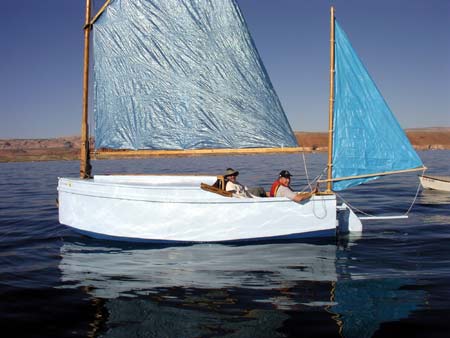
Here is a Musicbox2 out West.
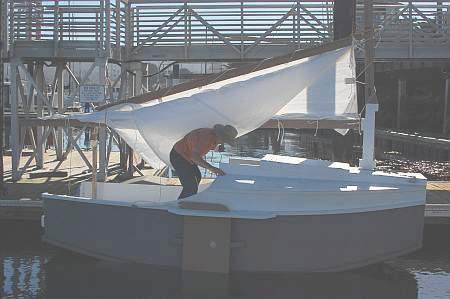
This is Ted Arkey's Jukebox2 down in Sydney. Shown with the "ketchooner" rig, featuring his own polytarp sails, that is shown on the plans. Should have a sailing report soon.
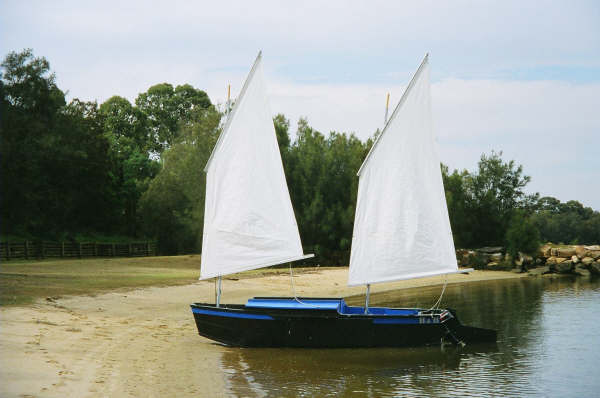
And the Vole in New York is Garth Battista's of www.breakawaybooks.com, printer of my book and Max's old outboard book and many other fine sports books. Beautiful job! Garth is using a small lug rig for sail, not the sharpie sprit sail shown on the plans, so I will continue to carry the design as a prototype boat. But he has used it extensively on his Bahamas trip towed behind his Cormorant. Sort of like having a compact car towed behind an RV.
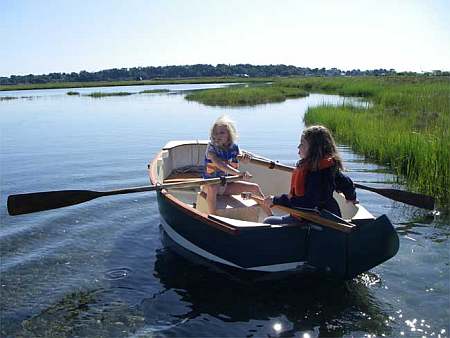
And a Deansbox seen in Texas:
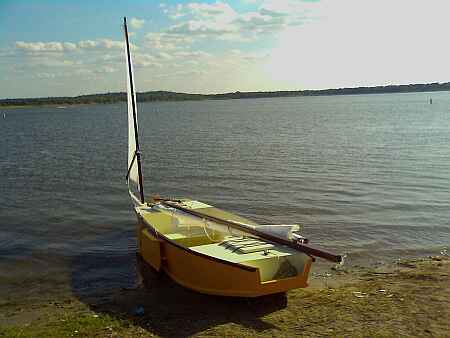
The prototype Twister gets a test sail with three grown men, a big dog and and big motor with its lower unit down. Hmmmmm.....
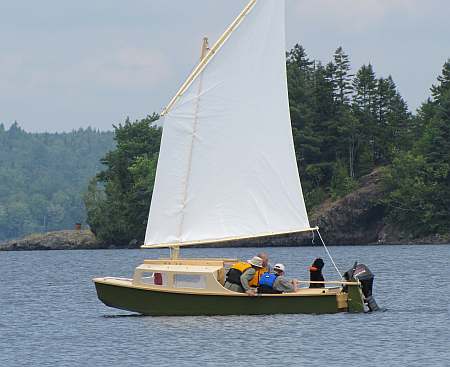
Jackie and Mike Monies of Sail Oklahoma have completed this Catbox. I sailed it at the meet and it is a keeper. Full report very soon.
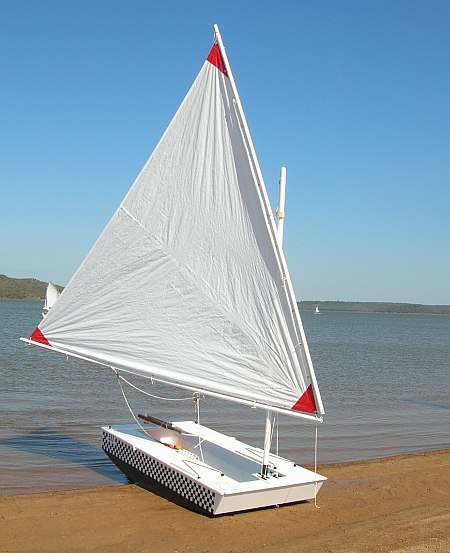
And the first D'arcy Bryn is ready for taping. You can follow the builder's progress at http://moffitt1.wordpress.com/ ....
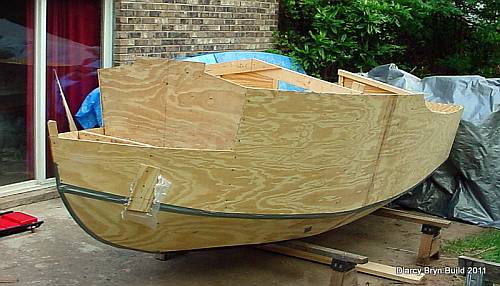
And the first Brucesboat is in the water for testing. A full report soon.
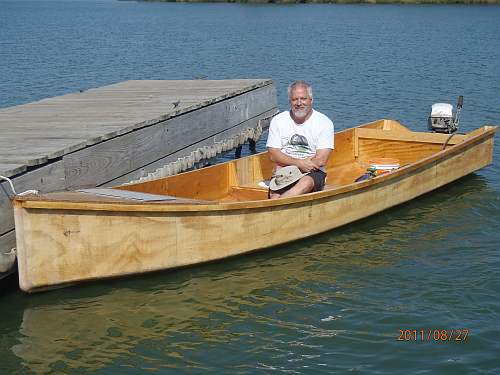
OK, so he found a major league goof in my plans on fitting the bilge panels. He did some cut and fit and did a great job of salvaging the work, but I have corrected the drawing for the aft end of the bilge panel (I drew it in upside down!!)
AN INDEX OF PAST ISSUES
Hullforms Download (archived copy)
Plyboats Demo Download (archived copy)
Brokeboats (archived copy)
Brian builds Roar2 (archived copy)
Herb builds AF3 (archived copy)
Herb builds RB42 (archived copy)